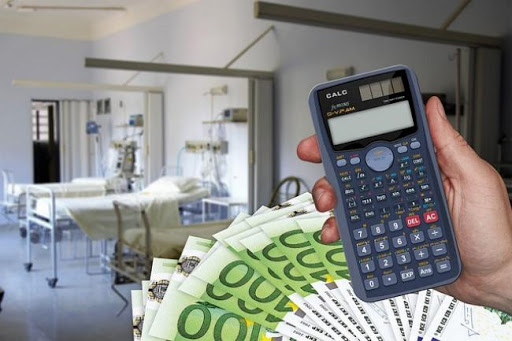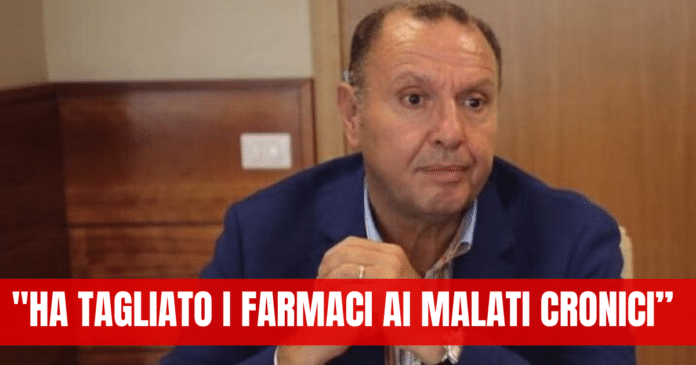
The commissioner for the Calabrian health recovery plan Cotticelli instead of engaging in the fight against the coronavirus, in fact among the innumerable decrees issued during this pandemic, only one speaks of it, found the  time to remove the medicines from the Calabrian patients by signing the DCA n. 63 of 6 March 2020 on the "containment of pharmaceutical expenditure".
time to remove the medicines from the Calabrian patients by signing the DCA n. 63 of 6 March 2020 on the "containment of pharmaceutical expenditure".
This is what "MEDIASS Catanzaro-Medics of general medicine associated in a mixed network" writes in a note, explaining: "The initial assumption of this decree is the fact that in Calabria the gross pharmaceutical expenditure per capita is 190.72 euros against the national average expenditure of 166.46 with a deviation of more than 14.6%. The purely economic assumption would have a logic if the number and type of chronically ill people in Calabria were comparable to the national ones. Instead, it happens that in Calabria there are many more chronically ill people than the Italian average and this is certified by Commissioner Scura, Cotticelli's predecessor, with his decree m. 103 dated 30 September 2015 which the current commissioner should compulsorily take into account.
In attachment no. 1 of decree 103 on p. 33 Commissioner Scura writes: 'Higher prevalence values (at least 10%) compared to the rest of the country are underlined for various pathologies…'. The annex is accompanied by tables from which it is easy to calculate that Commissioner Scura's 'at least 10%' corresponds to 14.5% more chronic pathologies in Calabria than in the rest of the country. There should therefore be nothing strange if Calabria with 14.5% of chronically ill people more than the rest of Italy spends 14.6 more on drugs and obviously a decree to reduce consumption should not be necessary because it would mean preventing to Calabrian patients to be able to take good care of themselves".
According to Mediass, on the other hand, “there is something, again certified by decree 103, which would impose an even greater pharmaceutical expense for the correct treatment of Calabrian patients, and it is the 'comorbidity' factor. The comorbidity tables of decree 103 quantify in about 50,000 Calabrians with more comorbidities than the Italian average.
Comorbidity is when in the same person there are two or more chronic diseases at the same time, this is a condition that requires, for a correct treatment, a higher pharmaceutical and health expenditure in general. Example: if there are 3 people, one with diabetes, one with arterial hypertension and one with chronic bronchitis and 1,000 euros each are spent to treat them in one year (the figure is symbolic) the total annual expenditure is 3,000 euros, but if the same diseases are found simultaneously in a single person to treat this single person with three diseases, 3000 euros are no longer spent in a year but up to 4500 euros can be spent, i.e. about 50% more for as validated also from the study 'Development and validation of an index for the adjustment of healthcare costs in general practice' published in 2015 in the journal Value in Health, and which predicts a variability in healthcare costs caused by comorbidity up to 49,72%.
but if the same diseases are found simultaneously in a single person to treat this single person with three diseases, 3000 euros are no longer spent in a year but up to 4500 euros can be spent, i.e. about 50% more for as validated also from the study 'Development and validation of an index for the adjustment of healthcare costs in general practice' published in 2015 in the journal Value in Health, and which predicts a variability in healthcare costs caused by comorbidity up to 49,72%.
But then why does Commissioner Cotticelli, who should be aware of these things, given that they are acts of his office, issue the drug-cutting decree? It does so because it slavishly applies the health recovery plan to which Calabria has been subjected for more than 10 years and which provides for savings at all costs. But is it about real savings?. Absolutely not, because it doesn't take great science to know that a chronically ill Calabrian, who cannot be treated well due to the restrictions of the return plan, gets worse, becomes more complicated and then needs more expense to be treated.
And this is what happened in Calabria because after 10 years of the repayment plan, and therefore because of it, the "alleged" Calabrian health deficit instead of decreasing in the last budget has doubled (160 million euros), despite the 'prudent' management of Calabrian healthcare by Commissioner Cotticelli on behalf of the Ministries of Economy and Health. And yes, because in these 10 years the great choices of the Calabrian health care have not been taken by the Calabrian administrators but by the ministries of the Economy and Health, in fact every decree of the commissioner before being published must, first of all, be endorsed by the ministry of 'Economy and then from that of Health in the series first savings and then the health of the Calabrians.
But the recovery plan by preventing the Calabrians from being treated has created further damage, in fact the chronically ill who cannot be treated well becomes so complicated that in order to be treated he must then make the journeys of hope, with great economic sacrifices and psychological discomforts. in treatment centers in the north (which are very expensive) with the consequence that this expense too has expanded enormously up to over 300 million euros per year. Obviously this additional expense increases the 'presumed overrun' of the same and imposes a further burden on the repayment plan restrictions.
An infernal circle from which it would have been possible to get out only if Commissioner Cotticelli, having taken note of what has been said up to now, had returned to Rome immediately after his appointment to tell the government 'Dear government, in Calabria there are many more chronically ill people than the rest of the 'Italy and if you don't give funding proportionate to the number of diseases, I risk looking like a smuggler who throws the Calabrians off the Calabrian health care boat (located in the center of the Mediterranean like a large boat) to their death, just like the smugglers do with more emigrants on boats'.
For Mediass "He should have behaved like this because the commissioner also knows that Calabria, in the face of these additional chronically ill patients, is the region that, for over two decades now, has received the least funds per capita in health care and therefore there is no there has never been any overspending but the simple fact that the insufficient funds received could not be enough to treat the approximately 300,000 more chronically ill people present in Calabria than in the rest of Italy.
He should have done it because he also knows that after 10 years of the return plan, for the first time in the history of Calabria, life expectancy has decreased instead of increasing. And the governments instead of imposing the repayment plan that has seriously worsened Calabrian health care should have changed the criteria for allocating health funds by doing it not as it is now but based on the number of diseases, more money where there are more diseases like in Calabria . And if Cotticelli during this dramatic pandemic that we are suffering has primary interest in saving spending, it means that the time has come when everyone, first of all the Calabrian politicians and administrators and then the Calabrian doctors and patients get together to put an end to this unjust, harmful and mocking health recovery plan and lay the foundations for a fair financing of his health care ".
Related news:
ATTACHMENTS
- Attachment 1 to DCA no. 63 of 6.3.2020 - Indicators of Appropriateness 2020-2021
- Attachment A to DCA no. 63 of 03.06.2020 - Quarterly Report - Affiliated Pharmaceutical Assistance
- Annex B to DCA no. 63 of 03/06/2020 - Asp Pharmaceutical Expenditure Monitoring
- Attachment C to DCA n.63 dated 6.3.2020 - Low Molecular Weight Heparins (LMWH)





